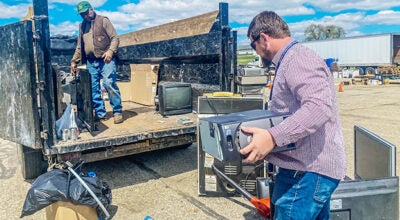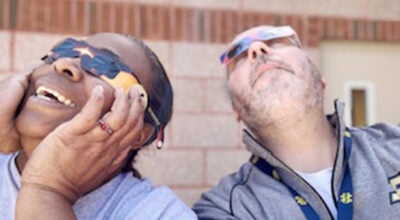Shaken and stirred
Published 11:40 pm Thursday, March 31, 2011
Janet Ross and Linda Campbell recounted teaching at Dean Hilda Alcindor’s nursing school in Haiti last October Thursday for Dowagiac Rotary Club. (The Daily News/John Eby)
Visiting Haiti for two weeks last October “was like going back 100 years to when entertainment was other people,” retired school nurse Janet Ross told Dowagiac Rotary Club Thursday.
She and Linda Campbell, a retired nurse practitioner formerly with Dr. James Wierman, shared their experiences at the nursing school at the January 2010 earthquake’s epicenter in Leogane where Southwestern Michigan College 42nd annual commencement speaker Hilda Alcindor is dean.
“They have the Rotary spirit of service above self,” President-Elect Barbara Groner introduced the women at Elks Lodge 889.
They lived two weeks at the women’s dorm of the nursing school while providing health care training to 13 seniors (Ross) and 29 juniors (Campbell), from Saturday to Saturday, in Leogane — 18 miles from Port-au-Prince, but a three-hour journey over rutted, congested roads.
Eighty-five percent of Leogane was reportedly destroyed by the quake.
Campbell said Alcindor’s facility is officially named the Episcopal University of Haiti School of Nursing.
It’s a four-year baccalaureate institution which admitted its first class in 2005 and graduated those students in 2009. One of its founders is a University of Michigan professor emeritus.
“Even with all the devastation and poverty in Haiti,” said Campbell, “we did have some humorous moments,” like encountering a green gecko not unlike the Geico car insurance spokeslizard.
While trying to shoo it from their room, they learned that geckos “self-amputate” their tails.
“All of a sudden the tail separated from its body and it was weaving around the floor,” Campbell recalled. “The tail eventually died.”
“Nurses are not very well respected in Haiti,” Campbell said. “(Nursing school founders) felt there needed to be some improvement in general standards of nursing. They also felt that nurses are pretty good at teaching and in leading, so maybe they could start increasing the health standards in Haiti.”
Alcindor was “the perfect candidate” for dean, Campbell said. “Raised in Haiti, she came to the United States as a young person, married, had children and then she went back to do this, so she understands the culture and knows Haitian Creole. Her students respect her greatly.”
Ross, who has been training health care workers in Panama and other spots around the Caribbean for years, showed a slide of the nursing school, which “has an elevated area that is kind of a gathering place and six classrooms.”
Many of its walls are a patchwork of what look like surgical scars.
“This building is relatively new and was built by a U.S. architect, so in spite of the fact it was at the epicenter of the earthquake,” Ross said, “it withstood, though suffered quite a few cracks.”
Visible across the street was a small tent city since evacuated.
There is a dormitory building with two wings — one for male students and one for female students.
“We shared a room. Each of us had a comfortable single bed,” Ross said. “We had two chairs and a desk. That was about it. We had no place to store things, so we kind of worked out of our suitcases.”
There was a window and a fan, but no air conditioning in the consistent 95- to 100-degree heat.
Electricity “is kind of spotty,” Ross said. “The generator goes on to produce electricity from about noon to 5, powering up these banks of batteries called inverters. At about 5 or 6 o’clock, the generator goes off and lights dim down. By 9 or 10, there was no electricity, so you had to go to bed” due to darkness.
Power disruptions frequently occur during daytime, too. Evenings in the waning light they prepared lesson plans seated on their individual beds.
Their bathroom had a sink for each of them and “we always had running water,” Ross said, although the trickle in the shower was augmented by ladling cold water from a bucket.
The friends disagree about how refreshing that felt.
“The first ladle full took your breath away, but it felt good to me because it was really hot,” Janet said.
“It felt good to Janet,” Linda said. “You tolerated the cold showers, but I never got used to it.”
A fence encircles the “campus.”
“Inside it were not only students, faculty and office personnel, but also a myriad of animals,” Ross narrated a slide of a rooster. “I suspect sometimes they end up on someone’s plate. There were turkeys and chickens. Cows and goats wander around. Students all did their own laundry by hand” and hung up their wash outdoors to dry on clotheslines.
“Across the road from the dean’s house is a Bill Gates house for a priest with a doctorate who is apparently the world’s foremost authority on mosquitoes. Notre Dame students come down to assist with research. We saw students going in and out of the gate.”
“Students have strong circles of friendship and they hang out in groups in the evening,” Ross said. “They don’t have television, of course, so it’s like going back 100 years in our country to when entertainment was other people.
“Our classes went from 8 to 12, then a two-hour break for lunch, and we would teach again from 2 to 4. We were there Monday through Friday for two weeks. Every morning, promptly at 8, school begins with a flag-raising ceremony. Once we got inside the class, each student group begins the morning before the lecture with prayer and song, which I thought was really nice.”
Campbell and Ross experienced two earthquakes during their stay — one at 6:30 a.m.
“We were both standing up. We weren’t in bed,” Ross said. “It felt like a semi truck ran into the building. Then you heard all of these feet running and screaming voices, so we ran outside. The dean told us it took quite a while for students to feel secure enough to even come back into the building. They became very nervous at having the door close. It’s innate to look for a way of escape.”
The other time, neither felt anything, “but in a millisecond, everyone was on their feet and running. They stampeded,” Janet said.
The kitchen staff always looked professional, even wearing nylons in the heat.
The process of breaking up huge slabs of concrete for removal continues, so dunes of rubble line roads.
While Ross’s group of students was small enough to sit in a semi-circle, Campbell said teaching “med/surg” to 25 to 29 could be “overwhelming. I felt like I was constantly overwhelming the students until by the end of the two weeks, I was getting overwhelmed. But they’re very respectful.”
On the last day in the afternoon, after their exams, students surprised Linda and Janet with a touching party which brought tears to their eyes.
“One student sang to us a cappella,” Campbell said. “It was very moving.”
Ross remarked that during the two-hour lunch break, students loved to braid each other’s hair to where she felt like she was at a beauty school rather than a nursing school.
When it came time for them to conclude a project they undertook, she said she offered to let them make their presentation in French or Creole, but students insisted on trying it in English.
A male graduate who works with the dean doubled as their driver and accompanied them back to Port-au-Prince for their flight home.
They showed slides of the hospital where Dr. Wierman leads mission trips.
“It was not flattened by the earthquake,” Ross said, “however, a lot of internal damage was done.”
Public transportation is in colorful buses like Ken Kesey’s pranksters created.
They didn’t see much military presence, although one shot shows a United Nations vehicle.
The most heartbreaking image is one forwarded to them by Dr. Wierman showing the inaugural 2009 graduation in an ornate cathedral decorated with colorful art.
While the pageantry sinks in, Ross adds that it was demolished, the art lost.
“They admit about 35 students as freshmen,” Ross said. “Through the course of four years, there’s a lot of attrition. For these students, it’s a rigorous curriculum and some can’t keep up. Haiti Nursing Foundation does a lot of fundraising not only for the buildings and the books and the dean’s salary, but student scholarships.”
“Harvey and I, and Linda, too, have been involved around the world in different mission activities,” Janet said. “I feel really good about empowering people within their own countries to make the difference. Initially, you have to go in and help, but in the long run, the big picture is going to be that people are empowered to do what needs to be done.”
“We hope these students stay in Haiti,” Campbell adds, “because once a young person leaves Haiti, they do not go back.”






